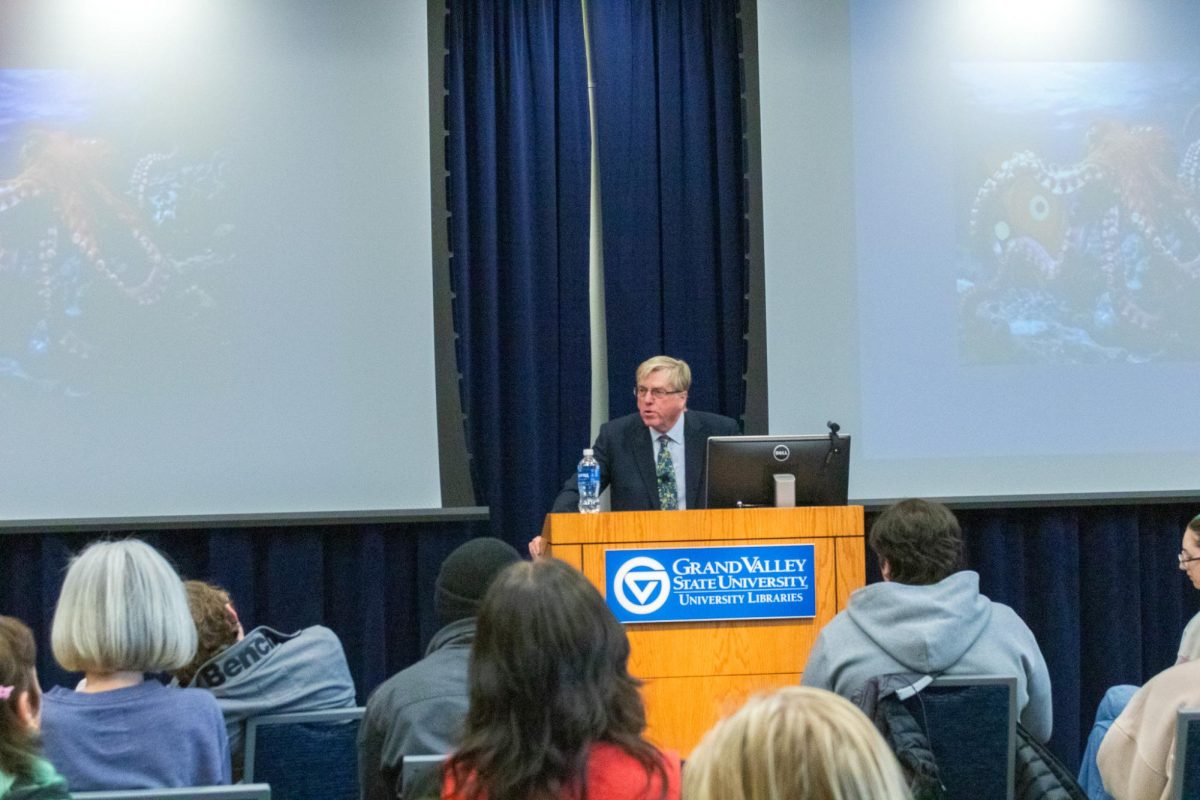An officer and a president
Feb 13, 2017
With the end of World War II and the beginning of the scientific and militaristic battlefield of the Cold War, the blurred line between political authorities and military leaders was at the forefront in a time when the U.S. was developing itself as a global superpower.
Looking at the relationship between civilians and military leaders in light of foreign affairs, H.W. Brands spoke at Grand Valley State University’s L.V. Eberhard Center Thursday, Feb. 9. During his lecture, he discussed the power struggle between President Harry Truman and General Douglas MacArthur.
Brands, a historian and Pulitzer Prize-nominated author who has written more than 25 books on American history, described the battle between Truman and MacArthur during the onslaught of the Cold War and the beginning of the Korean War.
Scott St. Louis, the program manager for the Common Ground Initiative at the Hauenstein Center for Presidential Studies, introduced Brands at the Common Ground-sponsored event and said his diverse background in teaching, writing and other endeavors made him “one of our favorite guests.”
“In addition to his prolific energies and distinctive style on the page, Professor Brands is also one of the most gifted lecturers and conversationalists and teachers working in the American historical profession today,” St. Louis said.
Brands discussed Truman’s rocky presidential beginning in the spring of 1945, in which he only served 82 days as President Franklin D. Roosevelt’s vice president before the latter’s death. Meanwhile, MacArthur was already a World War II military hero and was appointed the Supreme Commander of the Allied Powers in Japan, almost becoming, Brands said, “a second emperor.”
“The world doesn’t revolve around a single person and sometimes there are these stories where you want two powerful characters,” he said.
Truman would eventually fire MacArthur in April 1951, Brands said, for insubordination and to prevent nuclear war with communist nations. As a result, Brands said, this would label MacArthur as a martyr to partisan politics and turn Truman into one of the most unpopular presidents in U.S. history.
Building from his discussion of MacArthur’s desire for military victory and triumphs versus Truman’s desire to prevent another world war, Brands discussed how these significant characters in American history had to deal with difficult and uncertain decisions.
“The principle interim goal of the president of the United States was to keep the world from being blown up,” Brands said. “Harry Truman had a unique perspective (of) all the humans that have ever lived on this subject.
Truman is the only person who has ordered the use of nuclear weapons against an enemy, dropping two atomic bombs on Hiroshima and Nagasaki, Japan.
“He dropped two of them (atomic bombs) on Japan at the end of World War II and although he said he didn’t lose any sleep over his decisions, which I find a little bit disturbing, he didn’t want to do it again because it is a horrible thing to kill hundreds of thousands of people just “boom” like that,” Brands said. “Furthermore, it was more horrible in the 1950s because the Soviet Union had nuclear weapons of its own.”
Gleaves Whitney, director of the Hauenstein Center, said having an institution come together and host speakers and events which lead to an open forum discussion allows residents in West Michigan to rise up as leaders and create an area for common ground.
Whitney said the Hauenstein Center is a great platform for hosting events and speakers and learning about significant events in American history and how they shape the practices and standards set in today’s nation.
“We are getting lessons in what this republic stands for and is about,” he said, “and I see a strengthening of our institutions, and I think these institutions will weather whatever storms are happening upon both ends of Pennsylvania Avenue, the Supreme Court and out in the states.”






















